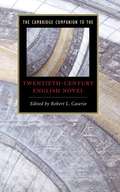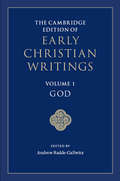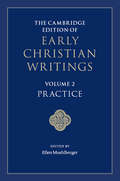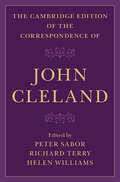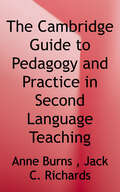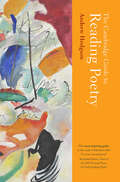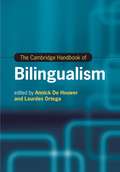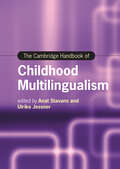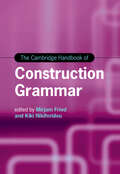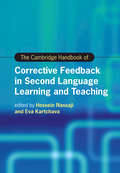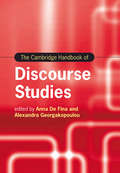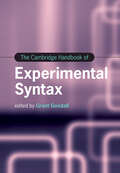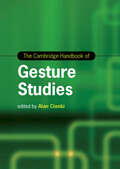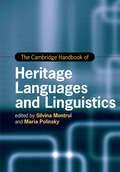- Table View
- List View
The Cambridge Companion to the Talmud and Rabbinic Literature
by Charlotte Elisheva Fonrobert Martin S. JaffeeThis volume introduces students of rabbinic literature to the range of historical and interpretative questions surrounding the rabbinic texts of late antiquity. The editors, themselves well-known interpreters of Rabbinic literature, have gathered an international collection of scholars to support students' initial steps in confronting the enormous and complex rabbinic corpus. Unlike other introductions to Rabbinic writings, the present volume includes approaches shaped by anthropology, gender studies, oral-traditional studies, classics, and folklore studies.
The Cambridge Companion to the Twentieth-Century English Novel
by Robert L. CaserioThe twentieth-century English novel encompasses a vast body of work, and one of the most important and most widely read genres of literature. Balancing close readings of particular novels with a comprehensive survey of the last century of published fiction, this Companion introduces readers to more than a hundred major and minor novelists. It demonstrates continuities in novel-writing that bridge the century's pre- and post-War halves and presents leading critical ideas about English fiction's themes and forms. The essays examine the endurance of modernist style throughout the century, the role of nationality and the contested role of the English language in all its forms, and the relationships between realism and other fictional modes: fantasy, romance, science fiction. Students, scholars and readers will find this Companion an indispensable guide to the history of the English novel.
The Cambridge Companion to the Victorian Novel
by Deirdre DavidIn the Victorian period, the British novel reached a wide readership and played a major role in the shaping of national and individual identity. As we come to understand the ways the novel contributed to public opinion on religion, gender, sexuality and race, we continue to be entertained and enlightened by the works of Dickens, George Eliot, Thackeray, Trollope and many others. This second edition of the Companion to the Victorian Novel and its contexts has been updated fully, taking account of new research and critical methodologies. There are four new chapters and the others have been thoroughly updated, as has the guide to further reading. Designed to appeal to students, teachers and readers, these essays reflect the latest approaches to reading and understanding Victorian fiction.
The Cambridge Companion to …: The Cambridge Companion to Petrarch
by Albert Russell Ascoli Ascoli, Albert Russell and Falkeid, Unn Unn FalkeidPetrarch (Francesco Petrarca, 1304–74), best known for his influential collection of Italian lyric poetry dedicated to his beloved Laura, was also a remarkable classical scholar, a deeply religious thinker and a philosopher of secular ethics. In this wide-ranging study, chapters by leading scholars view Petrarch's life through his works, from the epic Africa to the Letter to Posterity, from the Canzoniere to the vernacular epic Triumphi. Petrarch is revealed as the heir to the converging influences of classical cultural and medieval Christianity, but also to his great vernacular precursor, Dante, and his friend, collaborator and sly critic, Boccaccio. Particular attention is given to Petrach's profound influence on the Humanist movement and on the courtly cult of vernacular love poetry, while raising important questions as to the validity of the distinction between medieval and modern and what is lost in attempting to classify this elusive figure.
The Cambridge Companion to: The Cambridge Companion to Asian American Literature
by Kim, Daniel Y. and Parikh, Crystal Daniel Y. Kim Crystal ParikhThe Cambridge Companion to Asian American Literature offers an engaging survey of Asian American literature from the nineteenth century to the present day. Since the 1980s, Asian American literary studies has developed into a substantial and vibrant field within English and American Studies. This Companion explores the variety of historical periods, literary genres and cultural movements affecting the development of Asian American literature. Written by a host of leading scholars in the field, this book provides insight into the representative movements, regional settings, archival resources and critical reception that define Asian American literature. Covering subjects from immigrant narratives and internment literature to contemporary race studies and the problem of translation, this Companion provides insight into the myriad traditions that have shaped the Asian American literary landscape.
The Cambridge Companion to: The Cambridge Companion to Saul Bellow
by Victoria AaronsSaul Bellow is one of the most influential figures in twentieth-century American literature. Bellow's work explores the most important cultural and social experiences of his era: the impact of the Holocaust, the urban experience of European immigrants from a Jewish perspective, the fraught failures of the Vietnam War, the ideological seductions of Marxism and Modernism, and the changing attitudes concerning gender and race. This Companion demonstrates the complexity of this formative writer by emphasizing the ways in which Bellow's works speak to the changing conditions of American identity and culture from the post-war period to the turn of the twenty-first century. Individual chapters address the major themes of Bellow's work over more than a half-century of masterfully crafted fiction, articulating some of the most significant cultural experiences of the American twentieth century. It provides a comprehensive and accessible overview of a key figure in American literature.
The Cambridge Dictionary of English Grammar
by Pam PetersThe most up-to-date A-Z resource available for English grammar, this dictionary provides concise, practical definitions and explanations of hundreds of terms. Each term includes examples and cross references to related concepts. All the currently accepted terms of grammar are included, as well as older, traditional names, controversial new coinages, and items from the study of other languages. The dictionary pinpoints differences in the use of the same terminology, such as 'adjunct', 'complement', 'verb phrase', as well as alternative terms used for much the same concept, such as 'noun phrase', 'nominal group'; 'agentless passive', 'short passive'. It provides a wealth of examples, as well as notes on the relative frequencies of grammatical alternatives, such as 'will' and 'shall'. It also draws attention to some of the differences between spoken and written English grammar.
The Cambridge Dictionary of Linguistics
by Keith Brown Jim MillerThe Cambridge Dictionary of Linguistics provides concise and clear definitions of all the terms any undergraduate or graduate student is likely to encounter in the study of linguistics and English language or in other degrees involving linguistics, such as modern languages, media studies and translation. lt covers the key areas of syntax, morphology, phonology, phonetics, semantics and pragmatics but also contains terms from discourse analysis, stylistics, historical linguistics, sociolinguistics, psycholinguistics, computational linguistics and corpus linguistics. It provides entries for 246 languages, including 'major' languages and languages regularly mentioned in research papers and textbooks. Features include cross-referencing between entries and extended entries on some terms. Where appropriate, entries contain illustrative examples from English and other languages and many provide etymologies bringing out the metaphors lying behind the technical terms. Also available is an electronic version of the dictionary which includes 'clickable' cross-referencing.
The Cambridge Edition of Early Christian Writings: The Cambridge Edition of Early Christian Writings
by Andrew Radde-GallwitzThe Cambridge Edition of Early Christian Writings provides the definitive anthology of early Christian texts, from c. 100 to 650 CE. Its six volumes reflect the cultural, intellectual and linguistic diversity of early Christianity and are organized thematically on the topics of God, practice, Christ, community, reading and creation. The series expands the pool of source material to include not only Greek and Latin writings, but also Syriac and Coptic texts. Additionally, the series rejects a theologically normative view by juxtaposing texts that were important in antiquity but later deemed 'heretical', with orthodox texts. The translations are accompanied by introductions, notes, suggestions for further reading and scriptural indices. The first volume focuses on early Christian writings about God's nature and unity, and the meaning of faith. It will be an invaluable resource for students and academic researchers in early Christian studies, history of Christianity, theology, religious studies and late antique Roman history.
The Cambridge Edition of Early Christian Writings: The Cambridge Edition of Early Christian Writings
by Ellen MuehlbergerThe Cambridge Edition of Early Christian Writings provides definitive anthology of early Christian texts, from c. 100 to 650 CE. Its six volumes reflect the cultural, intellectual and linguistic diversity of early Christianity and are organized thematically on the topics of God, practice, Christ, community, reading and creation. The series expands the pool of source material to include not only Greek and Latin writings, but also Syriac and Coptic texts. Additionally, the series rejects a theologically normative view by juxtaposing texts that were important in antiquity but later deemed 'heretical', with orthodox texts. The translations are accompanied by introductions, notes, suggestions for further reading and scriptural indices. The second volume is focused on the topic of practice, including texts on education, advice, forming communities and instructing congregations. It will be an invaluable resource for students, academic researchers in early Christian studies, history of Christianity, theology, religious studies and late antique Roman history.
The Cambridge Edition of the Correspondence of John Cleland
by John ClelandThe first collected edition of John Cleland's correspondence, this volume provides a rare insight into a significant literary life and into jobbing authorship in the eighteenth century. All known letters by and to Cleland are included entire, alongside letter excerpts, diary entries and documents in which he is discussed by friends, enemies, family members and distant acquaintances. The volume also includes Cleland's christening record, a manuscript essay composed by Cleland in French on 'Litterateurs', and the will of Cleland's mother Lucy, whose many codicils reveal her determination to prevent her profligate son from squandering her fortune. Interspersed throughout are telling remarks about Cleland from figures such as Alexander Pope, Samuel Foote, Claude-Pierre Patu, and, most revealing and intriguing of all, vignettes by the great biographer James Boswell. The volume makes several new attributions and demonstrates for the first time the extent of Cleland's participation in the European Enlightenment.
The Cambridge Encyclopedia of the Language Sciences
by Patrick Colm HoganHave you lost track of developments in generative linguistics, finding yourself unsure about the distinctive features of minimalism? Would you like to know more about recent advances in the genetics of language, or about right hemisphere linguistic operation? The Cambridge Encyclopedia of the Language Sciences addresses these issues, along with hundreds of others. It includes basic entries for those unfamiliar with a given topic and more specific entries for those seeking more specialized knowledge. It incorporates both well-established findings and cutting-edge research and classical approaches and new theoretical innovations. The volume is aimed at readers who have an interest in some aspect of language science but wish to learn more about the broad range of ideas, findings, practices, and prospects that constitute this rapidly expanding field, a field arguably at the center of current research on the human mind and human society.
The Cambridge Guide to Pedagogy and Practice in Second Language Teaching
by Jack C. Richards Anne BurnsThis collection of original articles provides a state-of-the-art overview of key issues and approaches in contemporary language teaching. <p><p>Written by internationally prominent researchers, educators, and emerging scholars, the chapters are grouped into five sections: rethinking our understanding of teaching, learner diversity and classroom learning, pedagogical approaches and practices, components of the curriculum, and media and materials. <p><p>Each chapter covers key topics in teaching methodology such as reflective pedagogy, teaching large classes, outcomes-based language learning, speaking instruction, and technology in the classroom. Chapters assume no particular background knowledge and are written in an accessible style.
The Cambridge Guide to Reading Poetry
by Andrew HodgsonAt the heart of this book is a belief that poetry matters, and that it enables us to enjoy and understand life. In this accessible guide, Andrew Hodgson equips the reader for the challenging and rewarding experience of unlocking poetry, considering the key questions about language, technique, feeling and subject matter which illuminate what a poem has to say. In a lucid and sympathetic manner, he considers a diverse range of poets writing in English to demonstrate how their work enlarges our perception of ourselves and our world. The process of independent research is modeled step-by-step, as the guide shows where to start, how to develop ideas, and how to draw conclusions. Providing guidance on how to plan, organise and write essays, close readings and commentaries, from initial annotation to final editing, this book will provide you with the confidence to discover and express your own personal response to poetry.
The Cambridge Handbook of Bilingualism (Cambridge Handbooks in Language and Linguistics)
by Annick De Houwer Lourdes OrtegaThe ability to speak two or more languages is a common human experience, whether for children born into bilingual families, young people enrolled in foreign language classes, or mature and older adults learning and using more than one language to meet life's needs and desires. This Handbook offers a developmentally oriented and socially contextualized survey of research into individual bilingualism, comprising the learning, use and, as the case may be, unlearning of two or more spoken and signed languages and language varieties. A wide range of topics is covered, from ideologies, policy, the law, and economics, to exposure and input, language education, measurement of bilingual abilities, attrition and forgetting, and giftedness in bilinguals. Also explored are cross- and intra-disciplinary connections with psychology, clinical linguistics, second language acquisition, education, cognitive science, neurolinguistics, contact linguistics, and sign language research.
The Cambridge Handbook of Biolinguistics
by Cedric Boeckx Kleanthes K. GrohmannBiolinguistics involves the study of language from a broad perspective that embraces natural sciences, helping us better to understand the fundamentals of the faculty of language. This Handbook offers the most comprehensive state-of-the-field survey of the subject available. A team of prominent scholars working in a variety of disciplines is brought together to examine language development, language evolution and neuroscience, as well as providing overviews of the conceptual landscape of the field. The Handbook includes work at the forefront of contemporary research devoted to the evidence for a language instinct, the critical period hypothesis, grammatical maturation, bilingualism, the relation between mind and brain and the role of natural selection in language evolution. It will be welcomed by graduate students and researchers in a wide range of disciplines, including linguistics, evolutionary biology and cognitive science.
The Cambridge Handbook of Childhood Multilingualism (Cambridge Handbooks in Language and Linguistics)
by Anat Stavans Ulrike JessnerChildhood multilingualism has become a norm rather than an exception. This is the first handbook to survey state-of-the-art research on the uniqueness of early multilingual development in children growing up with more than two languages in contact. It provides in-depth accounts of the complexity and dynamics of early multilingualism by internationally renowned scholars who have researched typologically different languages in different continents. Chapters are divided into six thematic areas, following the trajectory, environment and conditions underlying the incipient and early stages of multilingual children's language development. The many facets of childhood multilingualism are approached from a range of perspectives, showcasing not only the challenges of multilingual education and child-rearing but also the richness in linguistic and cognitive development of these children from infancy to early schooling. It is essential reading for anyone interested in deepening their understanding of the multiple aspects of multilingualism, seen through the unique prism of children.
The Cambridge Handbook of Construction Grammar (Cambridge Handbooks in Language and Linguistics)
by Mirjam Fried Kiki NikiforidouConstruction Grammar is one of the fastest-growing branches of functional syntax. Bringing together an international team of scholars, this handbook provides a complete overview of the current issues and applications in this approach. Divided into six thematic parts, it covers the fundamental notions of Construction Grammar, its conceptual origins and the basic ideas that unite its various branches, its solid empirical grounding and affinities with corpus linguistics, and the diverse perspectives in constructional scholarship. It highlights advances in discourse-related topics and applications to various domains, including multimodal communication, language learning and teaching and computational linguistics, and each chapter contains numerous illustrative examples and case studies involving a variety of languages. It also includes in-depth, empirically-grounded analyses of diverse theoretical, methodological, and interdisciplinary issues, alongside step-by-step introductions to the theory, making it essential reading for both researchers and students working in functional and cognitive approaches to linguistic analysis and syntactic theory.
The Cambridge Handbook of Corrective Feedback in Second Language Learning and Teaching (Cambridge Handbooks in Language and Linguistics)
by Hossein Nassaji Eva KartchavaCorrective feedback is a vital pedagogical tool in language learning. This is the first volume to provide an in-depth analysis and discussion of the role of corrective feedback in second and foreign language learning and teaching. Written by leading scholars, it assembles cutting-edge research and state-of-the-art articles that address recent developments in core areas of corrective feedback including oral, written, computer-mediated, nonverbal, and peer feedback. The chapters are a combination of both theme-based and original empirical studies carried out in diverse second and foreign language contexts. Each chapter provides a concise review of its own topic, discusses theoretical and empirical issues not adequately addressed before, and identifies their implications for classroom instruction and future research. It will be an essential resource for all those interested in the role of corrective feedback in second and foreign language learning and how they can be used to enhance classroom teaching.
The Cambridge Handbook of Discourse Studies (Cambridge Handbooks in Language and Linguistics)
by Anna De Fina Alexandra GeorgakopoulouDiscourse studies, the study of the ways in which language is used in texts and contexts, is a fast-moving and increasingly diverse field. With contributions from leading and upcoming scholars from across the world, and covering cutting-edge research, this Handbook offers an up-to-date survey of Discourse Studies. It is organized according to perspectives and areas of engagement, with each chapter providing an overview of the historical development of its topic, the main current issues, debates and synergies, and future directions. The Handbook presents new perspectives on well-established themes such as narrative, conversation-analytic and cognitive approaches to discourse, while also embracing a range of up-to-the-minute topics from post-humanism to digital surveillance, recent methodological orientations such as linguistic landscapes and multimodal discourse analysis, and new fields of engagement such as discourses on race, religion and money.
The Cambridge Handbook of English Corpus Linguistics
by Douglas Biber Randi Reppen Biber, Douglas and Reppen, RandiThe Cambridge Handbook of English Corpus Linguistics (CHECL) surveys the breadth of corpus-based linguistic research on English, including chapters on collocations, phraseology, grammatical variation, historical change, and the description of registers and dialects. The most innovative aspects of the CHECL are its emphasis on critical discussion, its explicit evaluation of the state of the art in each sub-discipline, and the inclusion of empirical case studies. While each chapter includes a broad survey of previous research, the primary focus is on a detailed description of the most important corpus-based studies in this area, with discussion of what those studies found, and why they are important. Each chapter also includes a critical discussion of the corpus-based methods employed for research in this area, as well as an explicit summary of new findings and discoveries.
The Cambridge Handbook of Experimental Syntax (Cambridge Handbooks in Language and Linguistics)
by Grant GoodallExperimental Syntax is an area that is rapidly growing as linguistic research becomes increasingly focused on replicable language data, in both fieldwork and laboratory environments. The first of its kind, this Handbook provides an in-depth overview of current issues and trends in this field, with contributions from leading international scholars. It pays special attention to sentence acceptability experiments, outlining current best practices in conducting tests, and pointing out promising new avenues for future research. Separate sections review research results from the past 20 years, covering specific syntactic phenomena and language types. The handbook also outlines other common psycholinguistic and neurolinguistic methods for studying syntax, comparing and contrasting them with acceptability experiments, and giving useful perspectives on the interplay between theoretical and experimental linguistics. Providing an up-to-date reference on this exciting field, it is essential reading for students and researchers in linguistics interested in using experimental methods to conduct syntactic research.
The Cambridge Handbook of Generative Syntax
by Marcel Den DikkenSyntax – the study of sentence structure – has been at the centre of generative linguistics from its inception and has developed rapidly and in various directions. The Cambridge Handbook of Generative Syntax provides a historical context for what is happening in the field of generative syntax today, a survey of the various generative approaches to syntactic structure available in the literature and an overview of the state of the art in the principal modules of the theory and the interfaces with semantics, phonology, information structure and sentence processing, as well as linguistic variation and language acquisition. This indispensable resource for advanced students, professional linguists (generative and non-generative alike) and scholars in related fields of inquiry presents a comprehensive survey of the field of generative syntactic research in all its variety, written by leading experts and providing a proper sense of the range of syntactic theories calling themselves generative.
The Cambridge Handbook of Gesture Studies (Cambridge Handbooks in Language and Linguistics)
by Alan CienkiThe study of gesture-the movements people make with their hands when talking-has grown into a well-established field and research is still being pushed into exciting new directions. Bringing together a team of leading scholars, this Handbook provides a comprehensive overview of gesture studies, combining historical overviews as well as current, concise snapshots of state-of-the-art, multidisciplinary research. Organised into five thematic parts, it considers the roles of both psychological and interactional processes in gesture use, and considers the status of gesture in relation to language. Attention is given to different theoretical and methodological frameworks for studying gesture, including semiotic, linguistic, cognitive, developmental, and phenomenological theories and observational, experimental, corpus linguistic, ethnographic, and computational methods. It also contains practical guidelines for gesture analysis along with surveys of empirical research. Wide ranging yet accessible, it is essential reading for academic researchers and students in linguistics and cognitive sciences.
The Cambridge Handbook of Heritage Languages and Linguistics (Cambridge Handbooks in Language and Linguistics)
by Silvina Montrul Maria PolinskyHeritage languages are minority languages learned in a bilingual environment. These include immigrant languages, aboriginal or indigenous languages and historical minority languages. In the last two decades, heritage languages have become central to many areas of linguistic research, from bilingual language acquisition, education and language policies, to theoretical linguistics. Bringing together contributions from a team of internationally renowned experts, this Handbook provides a state-of-the-art overview of this emerging area of study from a number of different perspectives, ranging from theoretical linguistics to language education and pedagogy. Presenting comprehensive data on heritage languages from around the world, it covers issues ranging from individual aspects of heritage language knowledge to broader societal, educational, and policy concerns in local, global and international contexts. Surveying the most current issues and trends in this exciting field, it is essential reading for graduate students and researchers, as well as language practitioners and other language professionals.

